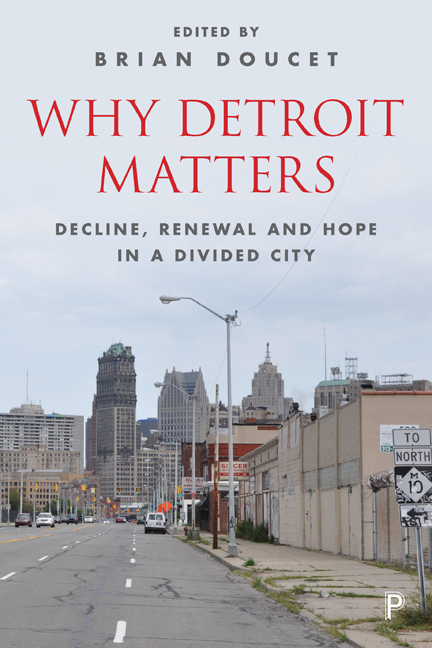Book contents
- Frontmatter
- Contents
- List of contributors
- List of figures and tables
- Acknowledgments
- one Introduction: why Detroit matters
- Section One Lessons from Detroit
- Intermezzo I You may not know my Detroit
- Section Two Practices from Detroit
- Intermezzo II My Detroit
- Section Three Conversations from Detroit
- References
- Index
eleven - Visions in conflict: a city of possibilities
Published online by Cambridge University Press: 05 April 2022
- Frontmatter
- Contents
- List of contributors
- List of figures and tables
- Acknowledgments
- one Introduction: why Detroit matters
- Section One Lessons from Detroit
- Intermezzo I You may not know my Detroit
- Section Two Practices from Detroit
- Intermezzo II My Detroit
- Section Three Conversations from Detroit
- References
- Index
Summary
Just as Dan Kinkead sees new possibilities emerging in Detroit, so, too, do Sharon (Shea) Howell and Richard Feldman. However, rather than focusing, as Kinkead did, on infrastructure or resilience, or on how bottom-up initiatives can become part of the planning system, as Khalil Ligon will describe in Chapter Twelve, Howell and Feldman's possibilities are much more rooted in social revolution and formed out of the visions of activists such as Grace Lee Boggs (see Chapter Twenty-five). They see Detroit as a space to begin anew, with genuine grassroots movements taking hold out of the destruction of the industrial era. Such a vision puts them at odds with many in the city's establishment, and these conflicts about the future of the city are outlined in this chapter.
They argue that Detroit's corporate visions are focused on taking back control of the city and that the imposition of an emergency manager and the declaration of bankruptcy in 2013 were central to this strategy. In contrast, their vision is rooted in local production and local, democratic control. Central to this is their People's Plan, formed by more than 60 different organizations to counter the Plan of Adjustment put forward by the city's “corporate powers.” Tapping into the city's lengthy history of resistance, Howell and Feldman argue that these two visions are now “at war.” Their chapter focuses on resistance and struggle in three important areas: land, water, and consciousness. Readers of this chapter will find many arguments that challenge or contradict many of the celebrated initiatives, narratives, and practices in Detroit. Such critical commentaries on the injustices of Detroit's contemporary “revitalization,” as well as visions for a more inclusive and just city, are important today as the city emerges from bankruptcy and new narratives focused on Downtown's “success” are constructed.
Richard Feldman and Shea Howell are members of the James and Grace Lee Boggs Center to Nurture Community Leadership. They have been active in community-based struggles in Detroit for more than four decades. Richard Feldman has also worked in a Ford assembly plant and is active in the United Auto Workers. Shea Howell is a Professor of Communication at Oakland University. Over the years, they have written many articles together.
- Type
- Chapter
- Information
- Why Detroit MattersDecline, Renewal and Hope in a Divided City, pp. 209 - 220Publisher: Bristol University PressPrint publication year: 2017



